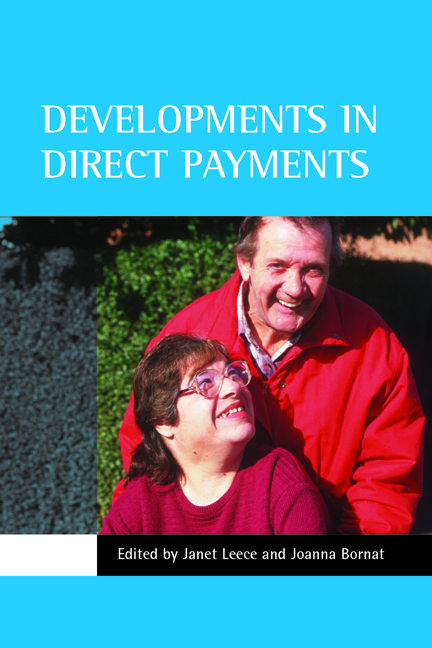Book contents
twenty - Holding the dream: direct payments and independent living
Published online by Cambridge University Press: 18 January 2022
Summary
This is a personal view, not the view of any organisation I have worked for. It is based on more than two decades of work in the independent living movement, and draws on the work and friendship of many disabled people. However, it does not pretend to represent anyone’s views but my own.
Direct payments are a means to an end: that end is independent living.
This quote appears in many books and training packs about direct payments, and I have used it regularly in presentations. I first heard it from one of the pioneers of direct payments in the UK, John Evans. But, as direct payments become more widely used, does it still hold true? Another of the pioneers, Philip Mason, gave me the title for this chapter. Speaking to a group of European activists, he said that the early days of campaigning for direct payments had been inspired by a dream, “… that disabled people would be enabled to fulfil their roles in terms of taking the opportunities society offers and meeting the responsibilities society requires”. At the end of his speech he exhorted his audience to “hold the dream” (Mason, 1999, p 22) to keep the link between direct payments and independent living a strong one. What made him feel the dream was under threat?
There are two forces pushing direct payments and the ideals of independent living away from each other. One is the brutal reality of budgets: trying to achieve independent living on a survival budget will never be easy. The other is the continuing dominance of the custodial model of care. Despite plenty of rhetoric to the contrary, the instinct of many community care professionals is to limit the risks taken by (and thus the autonomy of) disabled people.
Defining independent living
The Disability Rights Commission defines independent living thus:
The term independent living refers to all disabled people having the same choice, control and freedom as any other citizen – at home, at work, and as members of the community. This does not necessarily mean disabled people ‘doing everything for themselves’, but it does mean that any practical assistance people need should be based on their own choices and aspirations. (Disability Rights Commission, 2004)
- Type
- Chapter
- Information
- Developments in Direct Payments , pp. 285 - 292Publisher: Bristol University PressPrint publication year: 2006

